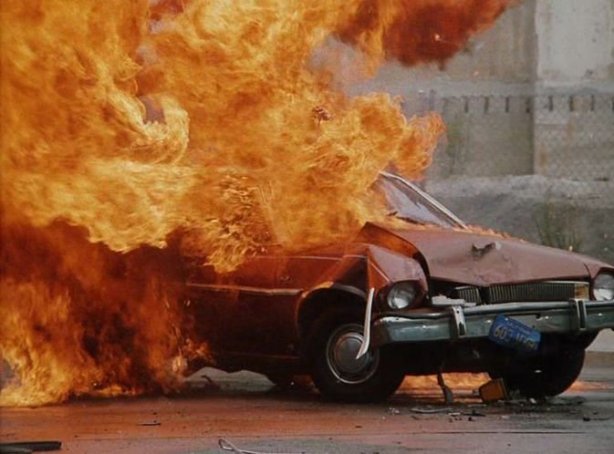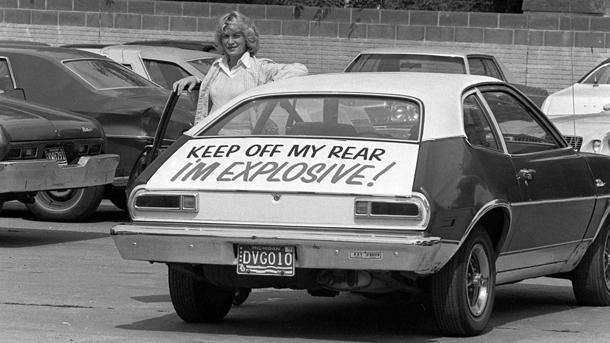by Fred W. Anson
In the response to the infamous Mormon, “if you want to know about Fords, then you don’t ask a Chevrolet dealer,” argument I offer the following:
The callow chestnut of Mormonism that says if you want to know about Fords, then you don’t ask a Chevrolet dealer, and if you want to know about Mormonism, then don’t ask a non-Mormon, is both wrong and lacks critical judgment. Groups like Consumer Reports prove their maxim false. Some of the best information comes from outside investigation (like Ford’s exploding Pinto gas tank), which outside information can be life-saving.
— Kurt Van Gorden, (as cited in “The Mormon Mirage” by Latayne Scott, p.19)
The Ford Pinto fuel tank controversy is really old news now but at the time it was a hot topic – I know I was 17-years old at the time and remember it well. It was common knowledge at the time that Ford and Ford dealers were mum about the problem and would deny it outright if customers asked about it. From the Wikipedia article on the subject:
Controversy followed the Pinto after 1977 allegations that the Pinto’s structural design allowed its fuel tank filler neck to break off and the fuel tank to be punctured in a rear-end collision, resulting in deadly fires from spilled fuel.
Critics alleged that the vehicle’s lack of reinforcing structure between the rear panel and the fuel tank meant the tank would be pushed forward and punctured by the protruding bolts of the differential — making the car less safe than its contemporaries.
According to a 1977 Mother Jones article by Mark Dowie, Ford allegedly was aware of the design flaw, refused to pay for a redesign, and decided it would be cheaper to pay off possible lawsuits. The magazine obtained a cost-benefit analysis that it said Ford had used to compare the cost of repairs (Ford estimated the cost to be $11 per car) against the cost of settlements for deaths, injuries, and vehicle burnouts . The document became known as the Ford Pinto Memo.
An example of a Pinto rear-end accident that led to a lawsuit was the 1972 accident resulted in the court case Grimshaw v. Ford Motor Co., in which the California Court of Appeal for the Fourth Appellate District upheld compensatory damages of $2.5 million and punitive damages of $3.5 million against Ford, partially because Ford had been aware of the design defects before production but had decided against changing the design.
The National Highway Traffic Safety Administration (NHTSA) ultimately directed Ford to recall the Pinto. Initially, the NHTSA did not feel there was sufficient evidence to demand a recall due to incidents of fire. 27 deaths were attributed to Pinto fires (the same number of deaths attributed to a Pinto transmission problem) and in 1974 the NHTSA ruled that the Pinto had no “recallable” problem.
In 1978, Ford initiated a recall providing a plastic protective shield to be dealer-installed between the fuel tank and the differential bolts, another to deflect contact with the right-rear shock absorber, and a new fuel-tank filler neck that extended deeper into the tank and was more resistant to breaking off in a rear-end collision.
(“Ford Pinto Fuel Tank Controversy” Wikipedia article)
The bottom line is this if you want to know about anything you need to consult outside sources as well as inside sources. And absolutely the best sources are former insiders that are now outsiders. That’s because they know the inside secrets and will share rather than hide them. That’s why in my article, “The Problem of the Mormon Tank (Revisited)” I stressed this key point:
Internal evidence that hasn’t been validated against external evidence can’t be completely trusted!
And what’s true of cars is true of churches too: If you’re going to make a decision where the stakes are high you would be wise to take your time, talk to insiders, outsiders, and former insiders – consider as much evidence as possible. The wise person always gathers facts and does their research before they make any major decision. And in the case of the Ford Pinto, it looks like this lady would have been a good source of information!



If I wanted to buy a Chevy a Ford dealer would give me the cons and vice versa from Chevy dealer If you check the dealership only you’re going to get a hyperbole of what’s good and nothing bad . So the Mormon advice is destructive for finding the TRUTH which Mormons fear and want to hide the truth about Mormonism .
LikeLike
I love this application and exploration of Van Gorden’s wisdom!
LikeLike